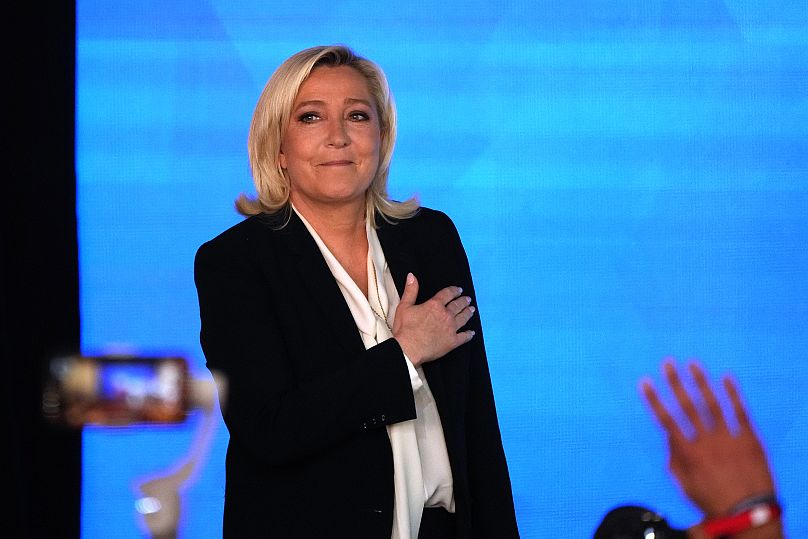There was relief among EU leaders but concern about the rise of support for the far-right. Here are five takeaways from France's election night.
French President Emmanuel Macron won a clear victory in the high-stakes presidential election that once again pitted him against far-right challenger Marine Le Pen.
 ADVERTISEMENT
ADVERTISEMENT
 ADVERTISEMENT
ADVERTISEMENT
But he inherits a fragmented country, with Le Pen increasing her vote share compared with 2017. Macron acknowledged on Sunday that many French people voted for him only to block the far-right from governing the country and not in support of his programme.
"We must my friends be benevolent and respectful because our country is steeped in so much doubt and so much division," Macron said in his victory speech.
Here are key takeaways from France's election night.
1. Macron wins re-election with 'Republican front' intact but 'less alive'
Emmanuel Macron was re-elected president with 58% of the vote, marking the first time in 20 years that a French president has won another term in office.
He won with less support however than in 2017, when he defeated Marine Le Pen with 66% of the vote.
It showed nonetheless there remains an effort among French voters to block the far-right from power in a "Republican front".
"The Republican front is alive and kicking, but it's less alive and each time it's less alive than in the previous elections," said Antonio Barroso, managing director at global advisory firm Teneo.
In his victory speech on Sunday, Macron acknowledged that many people voted for him to block the far-right from governing the country.
"I know that many compatriots voted to block the ideas of the extreme right, I want to thank them and tell them that I am aware that this vote obliges me for the years to come," Macron said, speaking about their "sense of duty" and "attachment to the Republic".
He added that he knew it was his responsibility to find answers to the "anger" that led millions of French people to vote for Le Pen.
2. France's far-right party progresses with all-time high
Marine Le Pen called her vote share -- an increase from 2017 -- a "resounding victory" as her far-right National Rally party received its highest support with 41% of the vote share.
In the 2017 election, Le Pen received 33.9% of the vote and when she ran in 2012, she won 17.9% in the first round. In 2002, her father, Jean-Marie Le Pen, won 17.8% of the vote in the second round against Chirac.
Le Pen said that the "historic score" would allow them to increase the number of MPs in the lower house of parliament, the National Assembly.
"It's definitely a better score for Le Pen than five years ago. Undoubtedly, she has managed to expand the amount of electoral support for her," said Barroso.
"The question I think going forward is whether she's able to carry this momentum into the legislative election."
Paul Bacot, an emeritus professor at Sciences Po Lyon, said that "not all the people who voted for Marine Le Pen are from the extreme right."
"The strength of the feeling of rejection against the incumbent president has inflated the score of the nationalists," Bacot added.
Notably, Le Pen won the election in overseas territories such as Guadeloupe, Martinique, Guyane, and La Réunion.
3. 'Relief' in Europe following France's high-stakes election
European leaders expressed "relief" after Macron's victory and said they were looking forward to cooperating with the re-elected French leader.
"In these turbulent times, we need a solid Europe and a France that is totally committed to a more sovereign and more strategic European Union," said European Council President Charles Michel in a tweet. "We can count on France for five more years," he added.
Commission President Ursula von der Leyen said she looked forward "to continuing our excellent cooperation" while Italian Prime Minister Mario Draghi said Macron's victory on Sunday was "wonderful news for Europe."
There had been concerns among many in Europe about the possibility of Le Pen being elected.
Douglas Webber, emeritus professor at the INSEAD business school, said that if she had been elected, there would have been "fairly swiftly a pretty deep crisis within in the EU."
Belgian MEP Guy Verhofstadt said Macron's victory in France's election was "much more than relief" but "a historic opportunity to profoundly reform the European Union’s defence, health, energy, democracy."
4. Abstention rate second-highest for runoff
The abstention rate in the election was 28%, which is the second-highest for a presidential runoff.
It was close to the record abstention rate, which was 31% in the 1969 runoff between Georges Pompidou and Alain Poher and was higher than the abstention rate two weeks ago in the first-round.
Abstention in France has been particularly high in local and regional elections. It is higher among young voters and among those who make the least amount of money.
Several young people told Euronews ahead of the election that they did not want to vote because they did not think the system represented them.
5. The third round: opposition parties turn to legislative elections
Opposition parties are already gearing up for the legislative elections on 12 and 19 June, where they will attempt to forge new alliances to counter Macron.
Marine Le Pen is "the opposition leader for France," National Rally spokesman Sebastien Chenu told Euronews, adding that the party would work hard ahead of those elections.
Far-left leader Jean-Luc Mélenchon, who came third in the first round of the election, has urged his supporters to vote in the "third round" in an attempt to gain a majority in parliament.
Webber said that Macron could probably do "relatively well" in the June parliamentary elections but "won't win as decisively as he won the last time."
But opposition parties in France will also have a hard time gaining MPs in June.
The majority vote with a requirement of 12.5% for candidates to make a runoff "only leaves some chance to very united and very strong political forces," said Bacot.
"It will be difficult for the left as it is today, but also for the far-right," he added.















